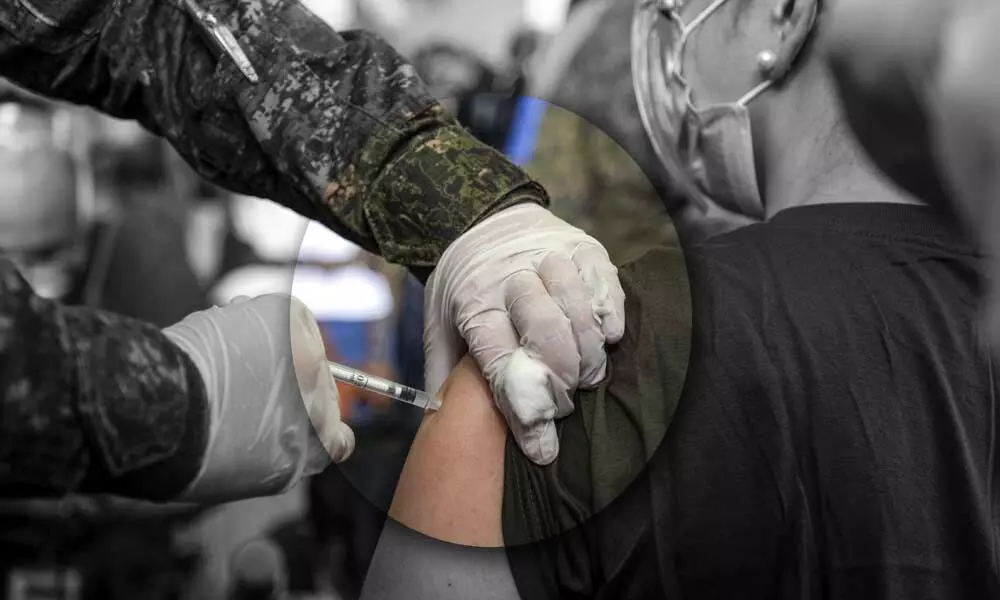Vax crisis isn't about J&J or AstraZeneca
The promise of the early 2000s has given way to a world in which life-saving treatments are again out of reach for the world’s poorest, especially as the nature of disease changes thanks to the successes of modern medicine
image for illustrative purpose

Biggest challenge is grossly unequal distribution of vaccines between rich and poor countries
To judge by the headlines, you'd think the most critical immunisation issue facing the world is the safety and hesitancy concerns over the AstraZeneca Plc and Johnson & Johnson vaccines.
That debate is genuinely important. Still, it shouldn't distract from the biggest challenge the world will face over the coming months: the grossly unequal distribution of vaccines between rich and poor countries.
The development and ramp-up of preventive medicine for the coronavirus is a testament to the innovative power of the modern global economy. Counting only drugs that are already on the market, total manufacturing capacity this year should be sufficient to deliver 12 billion doses, according to a database compiled by the Duke Global Health Innovation Center.
In theory, that might be enough to bring the Covid-19 pandemic to an end. With single-shot vaccines making up 1.5 billion of those doses that could deliver enough shots to immunise about 88 per cent of the world's population.
Stuck in the middle
It's a less rosy picture when you look at how many injections have actually been booked. So far there have been orders for just 6.96 billion doses, enough to achieve about 53 per cent coverage globally, according to the Duke database. Even those are grossly skewed toward rich countries: While there's sufficient medicine on order to fully immunise the population of high-income nations nearly two times over, in the lower middle-income ones, where the largest slice of the world's population lives, coverage falls to just 12 per cent.
That's a familiar problem. Every drug maker in the world (even generics manufacturers, often treated as tribunes of the global south) wants to sell to rich countries, where the profit margins are highest. In the 1990s and early 2000s, HIV was ravaging sub-Saharan Africa just as the newly formed World Trade Organisation was hammering out global regulations on the treatment of intellectual property. The question of pharmaceutical companies' obligation to distribute their products sparked major reforms.
In theory, the setup that resulted ought to ensure equal access to medicines around the world. Countries that fail to strike affordable licensing deals with global pharmaceutical companies can essentially annul their patents, in a process known as compulsory licensing, so that local generic drugmakers can produce their own versions. Those that lack the manufacturing capacity can even buy medicines from other countries, such as India.
Tripped up
In practice, the system isn't working. Compulsory licensing is barely invoked for new drugs these days. When it is, many of the instances in recent years have involved relatively wealthy countries using the framework as a tool to bargain down drug prices, rather than lower-income nations facing an absolute shortage of affordable supply.
The parameters under which compulsory licensing operates are slow and cumbersome, requiring rounds of negotiations between governments and pharmaceutical companies, and matching licenses by importing and exporting governments. Since such licenses are typically issued in defiance of the original developer, they usually depend on the ability of generics manufacturers to reverse-engineer the medicines, often without access to essential trade secrets. That's a challenge wherever cutting-edge technology is being used, especially given the short timescales involved and the need for rapid safety approvals.
The situation we're left with is failing the world. A 2016 study found that it typically takes between four years and seven years for medicines to be approved in sub-Saharan Africa from the point when the first regulatory steps are taken in rich countries.
While Covid has inspired regulatory shortcuts, such as the Covax programme to speed access to vaccines in low-income countries, the slow pace of deliveries outside of the wealthiest nations is grossly inadequate. That's especially the case as the centre of gravity of infections moves from rich nations and large emerging economies to a host of smaller countries less able to scale up domestic drug manufacturing.
Next phase
The best hope for a breakthrough comes from the WTO's new director-general Ngozi Okonjo-Iweala, a former head of the United Nations-backed vaccine delivery partnership, who brought pharmaceutical companies, politicians and public health officials together in Geneva last week to find a solution.
US Trade Representative Katherine Tai promised at the conference to "learn from, and not repeat, the tragedies and mistakes of the past." Those words must now be put into action. One immediate solution - still being blocked by the governments of rich countries, including the US - would be a temporary waiver of the so-called TRIPS rules that govern trade in intellectual property. Such a waiver could be limited to Covid treatments and for the duration of the current public health emergency.
Beyond that, though, we need to recognize that the aspiration of a global trading system that would balance intellectual property protection with the health needs of all humanity has fallen short.
New problems
The promise of the early 2000s has given way to a world in which life-saving treatments are again out of reach for the world's poorest, especially as the nature of disease changes thanks to the successes of modern medicine. Cancer now kills more people in Africa than HIV, but two-thirds of countries in the region lack the most basic treatment facilities for the condition. If we're to protect ourselves against the next health crisis, we first need to reform the rules of global trade. (Bloomberg)

